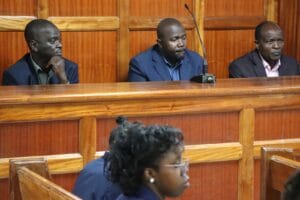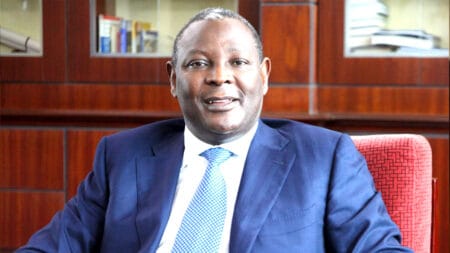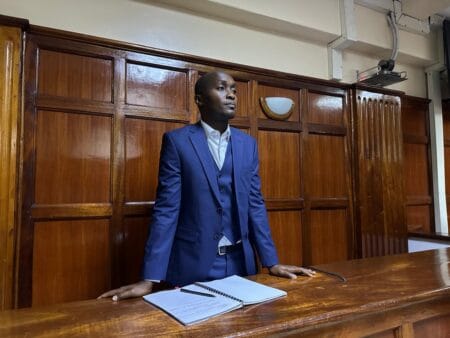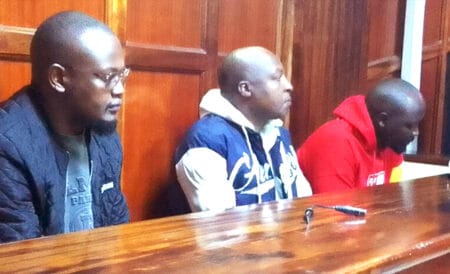Governor Okoth Obado
The 2018 murder of Rongo University student Sharon Otieno shocked Kenyan [Governor Okoth Obado], drawing intense media scrutiny and public outcry. The case took a significant turn when the Office of the Director of Public Prosecutions (ODPP) announced it had closed its case after presenting 42 witnesses. This decision marks a pivotal moment in the trial where former Migori Governor Okoth Obado, his personal assistant Michael Oyamo, and his driver Caspal Obiero face charges for Otieno’s brutal murder.
The Case
Sharon Otieno, a second-year medical records student at Rongo University, was found murdered in a forest in Uriri, Migori County, in September 2018. Her death was a gruesome crime that involved abduction, stabbing, and the dumping of her body. The case quickly gained national attention, not only due to the heinous nature of the crime but also because of the high-profile individuals implicated.
Key Figures Involved
- Former Migori Governor Okoth Obado: A prominent political figure, Obado’s involvement in the case has been a significant point of focus.
- Michael Oyamo: Personal assistant to Obado, Oyamo was allegedly involved in the logistics of the crime.
- Caspal Obiero: Obado’s driver, who is also accused of participating in the abduction and murder of Otieno.
Timeline of Events
- September 2018: Sharon Otieno’s body was discovered in a forest.
- September 2018: Arrests were made, including those of Obado, Oyamo, and Obiero.
- 2019-2023: Multiple court hearings, witness testimonies, and evidence presentations took place.
- June 2024: The ODPP closed its case after presenting 42 witnesses.
Role of the ODPP
The ODPP is responsible for instituting and undertaking criminal proceedings against any person before any court. In this case, the ODPP’s role involved meticulously gathering evidence, presenting witness testimonies, and ensuring that justice is pursued for Sharon Otieno.
The Trial Process

The trial has been a long and detailed process. It began with opening statements from both the prosecution and the defense, followed by the presentation of evidence and witness testimonies. Each phase of the trial has been crucial in building the case against the accused.
Prosecution’s Case
The prosecution’s strategy was to establish a strong connection between the accused and the murder of Sharon Otieno. They presented a total of 42 witnesses, including the investigating officer, who provided critical insights and evidence. This included forensic evidence, witness accounts of the events leading to Otieno’s abduction and murder, and details of the relationships between the accused and the victim.
Defense Strategy
The defense, led by Senior Counsel Kioko Kilukumi, aimed to discredit the prosecution’s evidence and present counterarguments. They highlighted inconsistencies in witness testimonies and questioned the validity of the evidence presented. The defense also called for more time to file written submissions, seeking to challenge the prosecution’s case comprehensively.
Judge’s Role
Judge Cecilia Githua has played a pivotal role in overseeing the trial, ensuring that proceedings are fair and just. Her responsibilities included ruling on the admissibility of evidence, managing courtroom decorum, and ultimately, making key decisions that influence the trial’s direction.
Public and Media Reaction
The case has garnered extensive media coverage and public interest. The media has closely followed every development, providing detailed reports and analysis. Public opinion has been divided, with many calling for justice for Sharon Otieno, while others have scrutinized the legal process and the involvement of high-profile individuals.
Legal Implications
The trial has significant legal implications, not only for the accused but also for public officials. A conviction could result in severe penalties, including life imprisonment. Moreover, the case underscores the importance of accountability and justice, particularly when involving powerful figures.
Challenges in the Case
Both the prosecution and defense have faced numerous challenges. The prosecution had to ensure that all evidence was thoroughly collected and presented convincingly. The defense, on the other hand, has had to address the substantial evidence and witness testimonies presented by the prosecution.
Closure by the ODPP
The ODPP’s decision to close its case after presenting 42 witnesses is a critical juncture in the trial. It signifies the completion of the prosecution’s presentation and shifts the focus to the defense’s submissions. This move indicates that the ODPP believes it has provided sufficient evidence to warrant a conviction.
Next Steps in the Trial
With the prosecution’s case closed, the defense will now file their written submissions. This will be followed by a review and decision on whether the accused have a case to answer. Judge Cecilia Githua has directed that the matter be mentioned virtually on June 20 for further directions.
Also Read: Sh9 million fraud involves rogue director Zeshan Saroya
The Sharon Otieno murder trial has been a landmark case in Kenya, highlighting issues of justice, accountability, and the rule of law. With the ODPP closing its case, the trial moves into its next critical phase. The upcoming decisions and potential outcomes will be closely watched, as they will have far-reaching implications for all parties involved.
Follow Us On Facebook
Sema Yote News
Explore a World of Stories at “Sema Yote,” Your Hub for Talented Writers Unveiling Exposés, Sharing Breaking News, and Diving into Engaging Human Interest Narratives. Connect with Us Today via Email:











